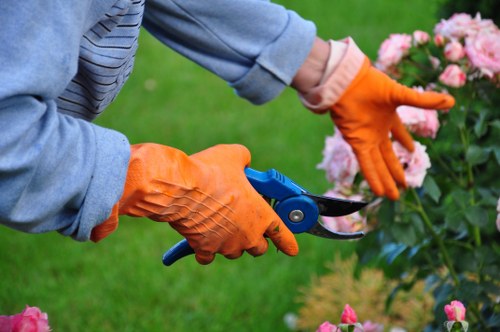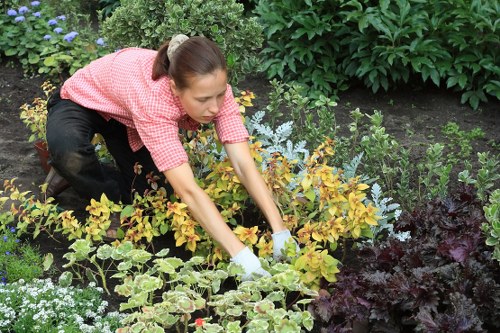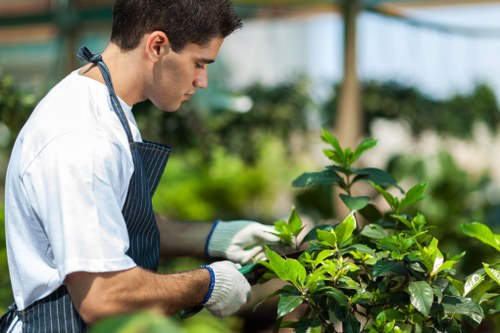Driveway Algae Removal Brent

Having a well-maintained driveway not only enhances the curb appeal of your home but also ensures safety by preventing slips and falls. However, one common issue that homeowners in Brent face is the growth of algae on their driveways. Algae thrives in damp, shaded areas and can turn your pristine driveway into a slippery hazard.
Understanding the causes of algae growth is the first step in effectively removing it. Algae thrives in environments where there is moisture, shade, and poor drainage. Driveways made of porous materials like concrete or stone are particularly susceptible because they retain moisture for extended periods, providing the perfect breeding ground for algae.
Addressing driveway algae removal promptly can save you from costly repairs and replacements in the future. By taking the right steps to eliminate algae, you not only preserve the aesthetics of your driveway but also maintain a safe environment for your family and visitors.

Why Algae Grows on Driveways
Algae are simple, plant-like organisms that thrive in moist environments. On driveways, algae can grow due to several factors:
- Moisture: Frequent wetting from rain, sprinklers, or poor drainage creates the ideal conditions for algae growth.
- Shade: Areas of your driveway that are shaded by trees, buildings, or other structures provide the low-light conditions that algae favor.
- Poor Maintenance: Lack of regular cleaning allows algae spores to settle and multiply over time.
- Porous Materials: Driveways made of materials that absorb water retain moisture longer, promoting algae growth.
Understanding these factors can help you take preventive measures to minimize the chances of algae infestation on your driveway.

Effective Methods for Algae Removal
1. Manual Cleaning
Manual cleaning is the most straightforward method for removing algae. It involves scrubbing the affected areas with a stiff brush and a cleaning solution.
2. Pressure Washing
Pressure washing uses high-pressure water jets to effectively remove algae from your driveway. It is a faster and more efficient method compared to manual cleaning.
3. Chemical Treatments
Chemical treatments involve applying specialized cleaners or fungicides designed to kill algae. These products can provide a more thorough and long-lasting solution.
4. Natural Remedies
For those who prefer eco-friendly options, natural remedies like vinegar or baking soda can be effective in eliminating algae without harmful chemicals.

Preventing Future Algae Growth
Prevention is always better than cure. Here are some tips to prevent algae from returning to your driveway:
- Improve Drainage: Ensure that water drains away from your driveway to reduce moisture levels.
- Increase Sunlight Exposure: Trim overhanging branches and remove obstructions that create shade.
- Regular Cleaning: Keep your driveway clean by removing debris and washing it regularly.
- Seal Your Driveway: Applying a sealant can help prevent moisture from penetrating the surface, making it harder for algae to grow.
Implementing these measures can significantly reduce the likelihood of algae returning to your driveway.

Choosing the Right Algae Removal Service in Brent
While DIY methods can be effective, sometimes it’s best to hire professionals for driveway algae removal. Here’s what to look for when choosing a service:
- Experience: Look for companies with a proven track record in algae removal.
- Reputation: Check reviews and testimonials to gauge customer satisfaction.
- Methods Used: Ensure they use safe and effective methods that won’t damage your driveway.
- Pricing: Compare prices to find a service that offers good value for money.
- Local Knowledge: Choose a service familiar with the specific conditions in Brent to ensure the best results.
By selecting the right service, you can ensure that your driveway is thoroughly cleaned and protected against future algae growth.
Local Areas Near Brent for Driveway Algae Removal
Brent is surrounded by several areas that also experience similar issues with driveway algae. Here are some nearby areas where residents can benefit from professional algae removal services:
- Stanmore: Located just north of Brent, Stanmore has many older properties with porous driveways vulnerable to algae growth.
- Kilburn: This bustling area often experiences shade and moisture, making algae a common problem.
- Willesden: Known for its narrow streets and older housing, Willesden driveways frequently require maintenance to prevent algae.
- Neasden: With a mix of residential and commercial properties, Neasden sees diverse types of driveways needing algae control.
- Hampstead Garden Suburb: This affluent area has driveways that benefit from regular cleaning to maintain their pristine appearance.
- Stonebridge: Stonebridge’s extensive pavement areas are prone to moisture accumulation, fostering algae growth.
- Wembley: A large, diverse area where algae removal professionals are in high demand.
- Harlesden: Rapidly developing, Harlesden driveways are often newly constructed but still face algae challenges.
- Kingsbury: With a mix of modern and traditional driveways, Kingsbury residents seek effective algae removal solutions.
- Mordey: A small area with specific needs for algae control due to its unique driveway materials.
Benefits of Professional Algae Removal
Hiring professionals for driveway algae removal offers several advantages:
- Expertise: Professionals have the knowledge and experience to tackle algae effectively.
- Efficiency: They can complete the job faster and more thoroughly than DIY methods.
- Safety: Professionals use the right tools and safety equipment to prevent accidents.
- Long-Term Solutions: They can offer advice and treatments to prevent algae from returning.
- Time-Saving: Hiring a service allows you to focus on other important tasks without worrying about driveway maintenance.
Investing in professional services ensures that your driveway remains clean, safe, and visually appealing for years to come.
Cost of Driveway Algae Removal in Brent
The cost of driveway algae removal in Brent can vary depending on several factors:
- Size of the Driveway: Larger driveways require more time and resources to clean.
- Extent of Algae Growth: Severe infestations may need more intensive treatments.
- Method Used: Chemical treatments might cost more than manual cleaning or pressure washing.
- Additional Services: Services like sealing or preventive treatments can add to the overall cost.
- Local Rates: Prices can vary based on the competitiveness and cost of living in Brent.
On average, residents can expect to pay between £100 to £300 for professional algae removal services, depending on the aforementioned factors.
DIY vs. Professional Algae Removal
Deciding between DIY and professional algae removal depends on your specific situation:
DIY Algae Removal
DIY methods can be cost-effective and allow you to tackle small algae patches on your own. Common DIY techniques include:
- Using a stiff brush and household cleaners like vinegar or bleach.
- Pressure washing your driveway with rented equipment.
- Applying natural remedies such as baking soda solutions.
While DIY can be effective for minor issues, it may not provide a long-term solution and can be labor-intensive.
Professional Algae Removal
Professional services offer comprehensive cleaning using specialized equipment and products. Benefits include:
- Thorough removal of algae, ensuring complete cleanliness.
- Long-lasting results with preventive treatments.
- Time and labor savings.
- Professional advice on maintaining a algae-free driveway.
For extensive algae growth or if you prefer a hassle-free solution, hiring professionals is the better option.
Choosing the Right Cleaning Solutions
Selecting the appropriate cleaning solution is crucial for effective algae removal without damaging your driveway. Here are some options:
Chemical Cleaners
Chemical cleaners are designed to kill algae and provide a quick clean. They are highly effective but should be used with caution to avoid harming plants and pets.
Eco-Friendly Solutions
For environmentally conscious homeowners, eco-friendly solutions like vinegar or baking soda are great alternatives. These options are safe for the environment and still effective in removing algae.
Biodegradable Cleaners
Biodegradable cleaners are another safe option that break down naturally, minimizing environmental impact while still providing effective algae removal.
Choosing the right solution depends on your preferences and the specific needs of your driveway.
Maintaining a Clean Driveway
Once you've successfully removed algae, maintaining a clean driveway is essential to prevent future growth. Here are some maintenance tips:
- Regular Cleaning: Sweep and wash your driveway regularly to remove dirt and debris that can harbor algae spores.
- Seal Your Driveway: Applying a sealant protects the surface from moisture penetration, making it harder for algae to grow.
- Trim Vegetation: Keep trees and shrubs trimmed to allow more sunlight to reach your driveway.
- Improve Drainage: Ensure that water flows away from your driveway by fixing drainage issues or installing proper grading.
- Use Algae-Resistant Materials: If you're considering replacing your driveway, opt for materials that are less prone to algae growth.
Consistent maintenance not only keeps your driveway looking great but also extends its lifespan.
Environmental Considerations
When removing algae from your driveway, it's important to consider the environmental impact of the methods you choose:
Using Chemicals
Chemical cleaners can be effective but may harm plants, animals, and beneficial microorganisms in the soil. Always follow the manufacturer's instructions and use chemicals sparingly.
Eco-Friendly Alternatives
Opting for natural or biodegradable cleaners reduces the environmental footprint of your algae removal efforts. These solutions are safer for the ecosystem and can be just as effective with regular application.
Water Usage
Pressure washing can use a significant amount of water. To minimize waste, consider using water-efficient pressure washers or applying cleaning solutions that require less water for rinsing.
Balancing effective algae removal with environmental responsibility ensures that your efforts do not negatively impact the surrounding ecosystem.
Common Mistakes to Avoid
When tackling algae removal, avoiding common mistakes can lead to better results:
- Using Harsh Chemicals: Overusing or using the wrong chemicals can damage your driveway and surrounding vegetation.
- Ignoring Safety Precautions: Always wear protective gear when handling cleaning agents and operating equipment like pressure washers.
- Not Addressing Underlying Issues: Simply removing algae without fixing moisture or shade problems can lead to recurrence.
- Skipping Maintenance: Neglecting regular maintenance allows algae to grow back quickly.
- Using the Wrong Tools: Using abrasive brushes or equipment can damage the surface of your driveway.
By being mindful of these mistakes, you can ensure a more effective and lasting algae removal process.
Seasonal Considerations
Algae growth can be influenced by seasonal changes. Understanding how different seasons affect algae can help you plan your maintenance efforts:
Spring
Spring brings increased moisture from rain and melting snow, providing ideal conditions for algae growth. This is a great time to perform a thorough cleaning and apply preventive treatments.
Summer
While summer generally has more sunlight, dry spells can still leave spots where algae can thrive. Regular inspections and quick cleanups can prevent buildup.
Autumn
Autumn sees falling leaves and increased shade as trees lose their foliage, creating perfect conditions for algae to grow. Timely cleaning before winter can minimize residues.
Winter
Winter weather can leave your driveway wet and shaded due to snow and ice. Brief cleaning activities during less severe weather can help keep algae under control.
Adjusting your maintenance routine according to the seasons ensures year-round protection against algae growth.
Health and Safety Implications
Algae on driveways is not just a cosmetic issue—it also poses health and safety risks:
- Slip Hazards: Algae makes surfaces slippery, increasing the risk of falls and injuries.
- Respiratory Issues: In some cases, certain types of algae can release spores that may cause respiratory problems, especially for individuals with allergies or asthma.
- Structural Damage: Prolonged moisture retention can lead to surface degradation, making your driveway more susceptible to cracks and potholes.
- Pet Safety: Pets walking on algae-covered driveways might be at risk of slipping or ingesting harmful substances if chemicals are used excessively.
Maintaining a clean driveway by removing algae promptly ensures a safer environment for everyone.
Tools and Equipment for Algae Removal
Having the right tools and equipment can make algae removal more effective and efficient:
- Stiff Brushes: Ideal for scrubbing algae off the driveway surface manually.
- Pressure Washers: High-pressure water jets can remove stubborn algae quickly.
- Protective Gear: Gloves, goggles, and masks protect you from chemicals and debris during cleaning.
- Cleaning Solutions: Specialized algae cleaners or eco-friendly options like vinegar can enhance cleaning efforts.
- Squeegees: Useful for removing excess water after washing to prevent moisture retention.
Investing in the right tools ensures thorough cleaning and minimizes the effort required for algae removal.
Case Studies: Successful Algae Removal in Brent
Looking at successful algae removal cases can provide valuable insights and confidence in the process:
Case Study 1: Residential Driveway in Kilburn
A homeowner in Kilburn faced severe algae infestation due to persistent shade and poor drainage. By hiring a professional service, they used a combination of pressure washing and eco-friendly cleaners, followed by sealing the driveway. The result was a clean, algae-free driveway with enhanced durability.
Case Study 2: Commercial Property in Wembley
A commercial property in Wembley needed quick and effective algae removal to maintain a professional appearance. Professionals employed specialized fungicides and pressure washing, ensuring the driveway was safe and presentable for clients and customers.
Case Study 3: Old Stone Driveway in Stanmore
An old stone driveway in Stanmore was struggling with algae and moss growth. A tailored maintenance plan involving manual scraping, eco-friendly treatments, and regular maintenance checks successfully restored the driveway's look and safety.
Long-Term Benefits of a Clean Driveway
Maintaining a clean and algae-free driveway offers several long-term benefits:
- Enhanced Curb Appeal: A clean driveway makes a strong first impression, increasing the overall attractiveness of your property.
- Increased Property Value: Well-maintained driveways contribute to higher property values and can be a selling point.
- Safety: Eliminating algae reduces slip hazards, protecting family members and visitors from potential injuries.
- Durability: Regular cleaning and maintenance prevent surface degradation, extending the lifespan of your driveway.
- Cost Savings: Preventative maintenance avoids costly repairs and replacements in the future.
Investing time and resources into algae removal pays off through lasting benefits for your property and peace of mind.
Conclusion
Driveway algae removal in Brent is essential for maintaining the safety, aesthetics, and longevity of your property. Whether you choose DIY methods or professional services, understanding the causes and solutions for algae growth will help you make informed decisions. Regular maintenance, preventive measures, and choosing the right cleaning solutions ensure your driveway remains clean and free from algae.
By addressing algae issues promptly and effectively, you can enjoy a beautiful, safe driveway that enhances the overall appeal of your home. Don't let algae compromise your driveway's integrity—take action today to preserve its condition for years to come.
Frequently Asked Questions
1. How often should I clean my driveway to prevent algae growth?
Regular cleaning, ideally once every few months, helps prevent algae buildup. Additionally, inspect your driveway after heavy rains or storms to address any moisture-related issues promptly.
2. Are there eco-friendly methods for removing algae from driveways?
Yes, natural solutions like vinegar, baking soda, and biodegradable cleaners are effective for algae removal and are safer for the environment compared to harsh chemical cleaners.
3. Can algae damage my driveway permanently?
While algae itself doesn't cause long-term structural damage, the moisture it retains can lead to surface degradation, cracks, and potholes over time. It's important to remove algae promptly and maintain your driveway.
4. Is pressure washing safe for all types of driveways?
Pressure washing is generally safe for most driveway materials, including concrete and stone. However, it's important to use the correct pressure setting to avoid damaging the surface. When in doubt, consult a professional.
5. How can I prevent algae from returning after removal?
Implement preventive measures such as improving drainage, increasing sunlight exposure, applying sealants, and maintaining regular cleaning routines to deter algae from growing back on your driveway.


